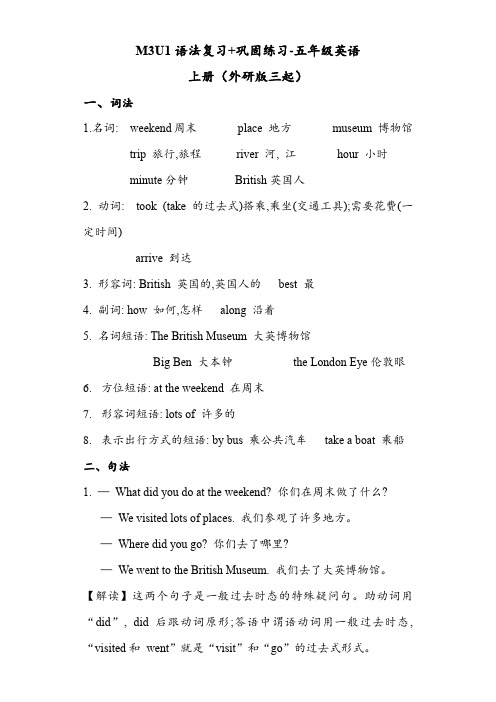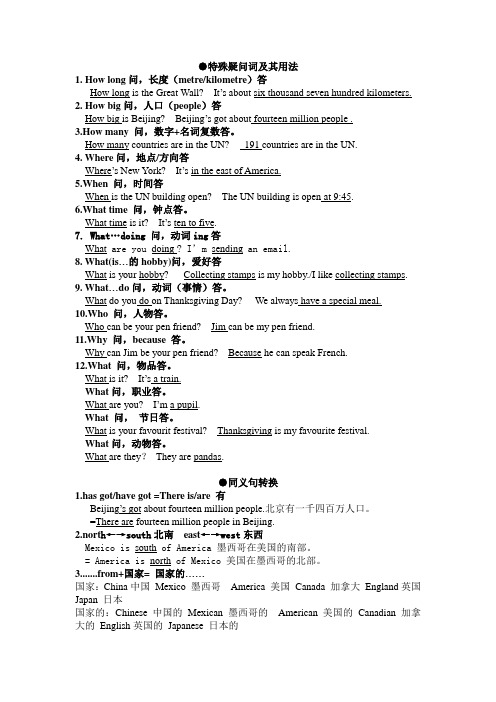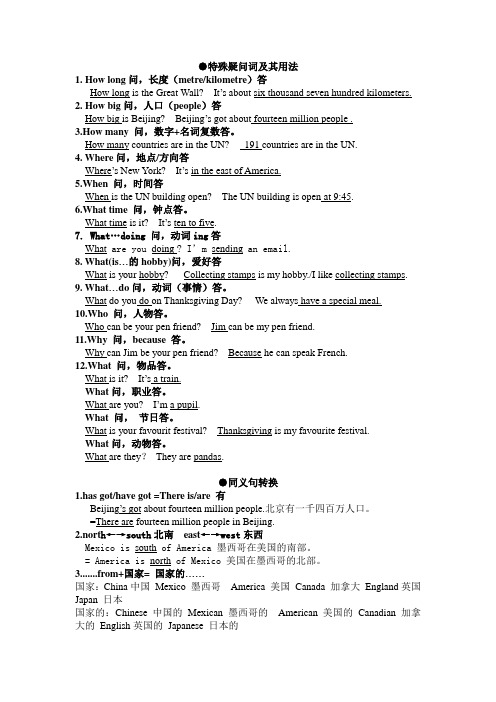外研版小学英语语法及习题汇总
(完整word版)外研社一起小学英语二年级下语法总结及练习题

(完整word版)外研社一起小学英语二年级下语法总结及练习题一、功能:二、构成:1. be动词:主语+be(am, is, are)+其它。
例如:I am a boy.我是一个男孩。
肯定句:主语+be+其它。
例如:He is a worker.他是工人。
否定句:主语+ be + not +其它。
例如:He is not a worker.他不是工人。
一般疑问句:Be +主语+其它。
(be动词移到句首),例如:Is he a worker?2.行为动词:主语+行为动词(+其它)。
注意:当主语为第三人称单数(he, she, it)时,要在动词后加"-s"或"-es"。
肯定句:主语+动词原形(+其它)。
例如:I like bread.否定句:主语+ don't( doesn't ) +动词原形(+其它)。
例如:I don't like bread。
当主语为第三人称单数时,要用doesn't构成否定句。
例如:___.一般疑问句:Do( Does ) +主语+动词原形+其它。
(句首加助动词do, does)例如:Do you often play football?- Yes, I do. / No, I don't.当主语为第三人称单数时,要用does构成一般疑问句。
三、动词+s的变化规则:当主语为第三人称单数时,动词要加上-s或-es。
例如:She likes apples.她喜欢___。
1. In general, to make a noun plural, you just add -s, for example: cook-cooks, milk-milks.2. If a noun ends in s, x, sh, ch, or o, you add -es, for example: guess-guesses, wash-washes, watch-watches.Exercise:Fill in the blanks with am, is, or are.1. I am a boy. Are you a boy? No, I am not.2. The girl is Jack's sister.3. The dog is tall and fat.4. The man with big eyes is a teacher.5. Is your brother in the classroom?6. Where is your mother? She is at home.7. How is your father?8. Mike and Liu Tao are at school.9. Whose dress is this?10. ___?11. That is my red skirt.12. Who am I?13. The jeans are on the desk.14. Here is a scarf for you.15. Here ___.16. The black gloves are for Su Yang.17. This pair of gloves is for Yang Ling.18. The two cups of milk are for me.19. Some tea is in the glass.___.1. She always (sing) in the shower.2. My friends (play) ___.3. The cat (sleep) on the windowsill.4. He (study) hard for his exams.5. They (watch) TV every night.6. I (like) to read books before bed.7. She (dance) beautifully.8. We (eat) ___.9. He (work) ___.10. The children (play) in the park.1. He often has dinner at home.2. David and Tom are in Class One.3. We do not watch TV on Monday.4. Mike did not go to the zoo on Sunday.5. Do they like the World Cup?6. What do they often do on Saturdays?7. Do your parents read newspapers every day?8. ___.9. She and I take a walk ___.改写后的句子:1. David does not watch TV every evening.2. Do you do your homework every day? No, I don't.3. Does she like milk? Yes, she does.4. Does Helen like playing computer games? No, ___'t. We don't go to school every morning.___.Where do you like taking photos?Where does Jim come from?Is she always a good student? No, she isn't.改错:1. Is your ___?2. Does he like going fishing?3. ___ class.4. Mr. Wu teaches us English.一般现在时翻译练:1. We go to school at seven o'clock every day.2. There are some students in the classroom.1. There are no chairs in the classroom.2. We love English very much.3. He usually walks to school.4. ___.5. ___.6. We don't go to school on Sundays.7. He often goes to bed at ten o'clock.8. Sometimes, I wake up at five o'clock.Present continuous tense:The present participle is formed by adding -ing to most verbs. For verbs that end in -e, the -e is dropped before adding -ing. For example, "carry" es "carrying," "catch" es "catching," and "enjoy" es "enjoying."1. The boy is not playing basketball.2. Is the boy playing basketball?3. Yes, he is.4. No, ___'t.5. Lucy and Lily are not watching TV.6. Are Lucy and Lily watching TV?7. Yes, they are.1. C. riding2. A. jumping1. I am currently reading a book about history.2. The children are playing ___.3. They don't watch TV in the evening. They do their homework.4. Listen! ___.5. What are you eating? I'm ___.6. Is she eating something?7. My nary is missing, I haven't found it anywhere.8. Having a computer for personal use is no easy task because ___.9. The building is being built, I can't stand the noise.。
外研社小学英语一起小学四年级下语法总结及练习题

外研社小学英语一起小学四年级下语法总结及练习题祈使句练题表达说话人对对方的叮嘱、劝告、请求或命令等,往往有表示请求、命令、希望、禁止、劝告等意思。
祈使句一般没有主语,实际上是省略了主语"You"。
句末用感叹号或句号,用降调朗读。
肯定结构都以动词原形开头。
祈使句的肯定句式有三种形式,即:1) Do型(以行为动词原形开头),例如:Sit down坐下!Stand up起立!2) Be型(以be开头),例如:Be quiet!安静!3) Let型(以let开头),例如:Let me help you.祈使句的否定结构是以"Don't+动词原形"开头。
例如:Don't go there。
please。
请别去那儿。
Don't be late。
不要迟到。
用括号内所给动词的适当形式填空。
1.Don't be late.2.Dust the dressing table.3.Don't speak with your mouth full of food.4.Don't talk and read a book.5.Don't drop the nice vase。
Sam.6.Look out。
A car is coming.7.Give us ten years and just see what our country will be like.8.Don't let the baby cry.9.Open the window and shut the door.10.Let'XXX.根据要求改写句子1.Read it again more slowly。
please。
(改为祈使句)2.Don't sit next to Nancy。
(改为否定句)1.There are no us formatting errors in the article。
最新外研版小学英语六年级上册语法知识汇总

烟店镇中心小学六年级小学阶段英语语法知识汇总一、词类:1、动词:行为动词、be动词、情态动词。
(1)行为动词原形、+s/es、+ed、+ing,具体判断方法如下:(2)be动词a、am-was is --was are--were 口诀:我用am, 你用are, is用在他她它,所有复数全用are。
b、肯定和否定句I am (not) from London. He /She is(not) a teacher. My hair is(not) long. Her eyes are(not) small.c、一般疑问句Am I …? Yes, you are. No, you aren’t. Are you/they…? Yes,we/ they are. No,we/ they aren’t. Is the cat fat? Yes, it is. No, it isn’t. is、am、are为一类,一般用于一般现在时、现在进行时和一般将来时中。
was和were为另一类,一般用于一般过去时。
(3)情态动词can、must、should、would、may。
情态动词后动词总是用原形。
(不受其他任何条件影响)2、名词这里强调两点:不可数名词都默认为单数,所以总是用is或者was。
如何加后缀:a.一般情况下,直接加-s,如:book-books, bag-bags, cat-cats, bed-beds b.以s. x. sh. ch结尾,加-es,如:bus-buses, box-boxes, brush-brushes, watch-watchesc.以“辅音字母+y”结尾,变y为i, 再加-es,如:family-families,strawberry-strawberriesd.以“f或fe”结尾,变f或fe为v, 再加-es,如:knife-knivese.不规则名词复数: man-men, woman-women, policeman-policemen, policewoman-policewomen, mouse-mice child-children foot-feet ,tooth-teeth , fish-fish, people-people, Chinese-Chinese, Japanese-Japanese 3形容词(包括副词)形容词表示某一事物的特征,副词表示某一动作的特征。
M3U1语法复习+巩固练习-五年级英语上册(外研版三起)

M3U1语法复习+巩固练习-五年级英语上册(外研版三起)一、词法1.名词: weekend周末place 地方museum 博物馆trip 旅行,旅程river 河, 江hour 小时minute分钟British英国人2. 动词: took (take的过去式)搭乘,乘坐(交通工具);需要花费(一定时间)arrive 到达3. 形容词: British 英国的,英国人的best 最4. 副词: how 如何,怎样along 沿着5. 名词短语: The British Museum 大英博物馆Big Ben 大本钟the London Eye伦敦眼6.方位短语: at the weekend 在周末7.形容词短语: lots of 许多的8.表示出行方式的短语: by bus 乘公共汽车take a boat 乘船二、句法1. —What did you do at the weekend? 你们在周末做了什么?—We visited lots of places. 我们参观了许多地方。
—Where did you go? 你们去了哪里?—We went to the British Museum. 我们去了大英博物馆。
【解读】这两个句子是一般过去时态的特殊疑问句。
助动词用“did”, did后跟动词原形;答语中谓语动词用一般过去时态,“visited和went”就是“visit”和“go”的过去式形式。
【举一反三】—What did you do yesterday? 昨天你做了什么?—I watched TV in the living room. 我在客厅里看电视了。
—What did you do last Sunday? 你上周日做了什么?—I washed clothes for my mother. 我帮我的妈妈洗衣服了。
2. — Did Lingling like the museum? 玲玲喜欢这个博物馆吗?— Yes, she did./No, she didn’t. 是的,她喜欢。
(完整版)外研版小学英语六年级上册语法知识点总结

●特殊疑问词及其用法1. How long 问,长度(metre/kilometre)答How long is the Great Wall? It’s about six thousand seven hundred kilometers.2. How big 问,人口(people)答How big is Beijing? Beijing’s got about fourteen million people .3.How many 问,数字+名词复数答。
How many countries are in the UN? 191 countries are in the UN.4. Where问,地点/方向答Where’s New York? It’s in the east of America.5.When 问,时间答When is the UN building open? The UN building is open at 9:45.6.What time 问,钟点答。
What time is it? It’s ten to five.7. What…doing 问,动词ing答What are you doing ? I’m sending an email.8. What(is…的hobby)问,爱好答What is your hobby? Collecting stamps is my hobby./I like collecting stamps. 9. What…do问,动词(事情)答。
What do you do on Thanksgiving Day? We always have a special meal.10.Who 问,人物答。
Who can be your pen friend? Jim can be my pen friend.11.Why 问,because 答。
(完整版)外研版小学英语六年级上册语法知识点总结

●特殊疑问词及其用法1. How long 问,长度(metre/kilometre)答How long is the Great Wall? It’s about six thousand seven hundred kilometers.2. How big 问,人口(people)答How big is Beijing? Beijing’s got about fourteen million people .3.How many 问,数字+名词复数答。
How many countries are in the UN? 191 countries are in the UN.4. Where问,地点/方向答Where’s New York? It’s in the east of America.5.When 问,时间答When is the UN building open? The UN building is open at 9:45.6.What time 问,钟点答。
What time is it? It’s ten to five.7. What…doing 问,动词ing答What are you doing ? I’m sending an email.8. What(is…的hobby)问,爱好答What is your hobby? Collecting stamps is my hobby./I like collecting stamps. 9. What…do问,动词(事情)答。
What do you do on Thanksgiving Day? We always have a special meal.10.Who 问,人物答。
Who can be your pen friend? Jim can be my pen friend.11.Why 问,because 答。
外研社小学英语一起小学五年级下语法总结及练习题

外研社小学英语一起小学五年级下语法总结及练习题这份文档旨在总结小学五年级下学期英语语法,并提供针对每个语法细节的练题。
1. 时态小学五年级下学期英语时态主要包括下列几种:- 现在进行时:be + V-ing- 一般现在时:V原 + s/es- 一般过去时:V过去 + 其他- 将来时:will + V原2. 名词名词的分类及用法:- 人名、地名、国名、月份、星期几等名词作为专有名词,通常首字母大写。
- 物质名词和抽象名词没有复数形式。
- 可数名词复数形式通常在词尾加s,不规则名词需根据单词形态进行变化。
- 不可数名词没有复数形式,可通过量词进行表示。
3. 形容词和副词形容词可以修饰名词,副词可以修饰动词、形容词和其他副词。
英语形容词和副词比较级和最高级的构成方式不同,在口语和书写中需要重点注意。
练题1. What are you doing? (现在进行时)2. They ___________ (play) in the park now. (现在进行时)3. She often ___________ (go) to school by bike. (一般现在时)4. Mike ___________ (study) English last night. (一般过去时)5. I ___________ (visit) my grandparents next week. (将来时)答案:1. am watching TV.2. are playing.3. goes.4. studied.5. will visit.以上是外研社小学英语一起小学五年级下语法总结及练习题。
需要深入练习和学习的同学可以结合其他教材和练习题进行巩固。
外研版六年级上册英语语法知识汇总

语法知识(六上)Module 1Tell me more about...告诉我更多对于 ...的信息如: Tell me more about the Great Wall.告诉我更多对于长城的信息。
These +可数名词复数 +are great !如: These postcards are great ! 这些明信片太棒了!It ’ s a pictureof...它是一张 ...的图片It ’ s a picture of the Great Wall它.是一张长城的图片。
咨询长度的句型 -----How long...? 多长如: How long is it ? 它有多长。
答语: It ’s...long.如: It ’s more than twenty thousand kilometres long.它超出两万千米长。
How big 多大How big is Beijing ?北京有多大?答语: Beijing has got about twenty million people.北京大概有两千万人口。
咨询某地地点的句型 ----Where is...?如: Where’s New York纽?约在哪里?7.描绘某地的地点north 北east 东It ’ s in the south 南west 西Module 2描绘某处有某人 / 某物的句型 ----There is /are...有如: There’s a Chinatown in New York.在纽约有一个唐人街。
There is + 可数名词单数 / 不行数名词There are + 可数名词复数There be 构造的就近原则(2)There are many desks and chairs in the classroom.(3)There is a pen and many pencils in my bag.频度副词never sometimes often always从不有时常常老是重申句You do miss China 你!的确思念中国。
- 1、下载文档前请自行甄别文档内容的完整性,平台不提供额外的编辑、内容补充、找答案等附加服务。
- 2、"仅部分预览"的文档,不可在线预览部分如存在完整性等问题,可反馈申请退款(可完整预览的文档不适用该条件!)。
- 3、如文档侵犯您的权益,请联系客服反馈,我们会尽快为您处理(人工客服工作时间:9:00-18:30)。
外研版小学英语语法及习题汇总Company number:【WTUT-WT88Y-W8BBGB-BWYTT-19998】小学英语语法及习题一、名词复数规则写出下列各词的复数I _________him _________this ___________her ______watch _______child _______photo ________diary ______day________ foot________ book_______ dress ________tooth_______ sheep ______box_______ strawberry _____thief _______yo-yo ______ peach______ sandwich ______man______ woman_______ paper_______ juice___________water________ milk________ rice__________ tea__________ 二、一般现在时一般现在时用法专练:(一)、写出下列动词的第三人称单数drink ________ go _______ stay ________ make ________look _________ have_______ pass_______ carry ____come________ watch______ plant_______ fly ________study_______ brush________ do_________ teach_______ (二)、用括号内动词的适当形式填空。
1. He often ________(have) dinner at home.2. Daniel and Tommy _______(be) in Class One.3. We _______(not watch) TV on Monday.4. Nick _______(not go) to the zoo on Sunday.5. ______ they ________(like) the World Cup?6. What _______they often _______(do) on Saturdays?7. _______ your parents _______(read) newspapers every day?8. The girl _______(teach) us English on Sundays.9. She and I ________(take) a walk together every evening.10. There ________(be) some water in the bottle.11. Mike _______(like) cooking.12. They _______(have) the same hobby.13. My aunt _______(look) after her baby carefully.14. You always _______(do) your homework well.15. I _______(be) ill. I’m staying in bed.16. She _______(go) to school from Monday to Friday.17. Liu Tao _______(do) not like PE.18. The child often _______(watch) TV in the evening.19. Su Hai and Su Yang _______(have) eight lessons this term.20. -What day _______(be) it today?-It’s Saturday.(三)、按照要求改写句子1. Daniel watches TV every evening.(改为否定句)___________________________________________________2. I do my homework every day.(改为一般疑问句,作否定回答)________________________________________________________3. She likes milk.(改为一般疑问句,作肯定回答)___________________________4. Amy likes playing computer games.(改为一般疑问句,作否定回答)___________________________________________________5. We go to school every morning.(改为否定句)_______________________________________________________6. He speaks English very well.(改为否定句)___________________________________________________7. I like taking photos in the park.(对划线部分提问)________________________________________________________8. John comes from Canada.(对划线部分提问)___________________________________________________9. She is always a good student.(改为一般疑问句,作否定回答) ________________________________________________________ 10. Simon and Daniel like going skating.(改为否定句)___________________________________________________(四)、改错(划出错误的地方,将正确的写在横线上)1. Is your brother speak English __________________2. Does he likes going fishing __________________3. He likes play games after class. __________________4. Mr. Wu teachs us English. __________________5. She don’t do her homework on Sundays. _________________三、现在进行时(一)、写出下列动词的现在分词:play________ run__________ swim _________make__________go_________ like________ write________ _ski___________read________ have_________ sing ________ dance_________put_________ see________ buy _________ love____________live_______ take_________ come ________ get_________stop_________ sit ________ begin________ shop___________(二)、用所给的动词的正确形式填空:boy __________________ ( draw)a picture now.2. Listen .Some girls _______________ ( sing)in the classroom .3. My mother _________________ ( cook )some nice food now.4. What _____ you ______ ( do ) now?5. Look . They _______________( have) an English lesson .____________(not ,water) the flowers now.! the girls ________________(dance )in the classroom .is our granddaughter doing She _________(listen ) to music.9. It’s 5 o’clock now. We _____________(have)su pper now (wash )clothes Yes ,she is .(三)、句型转换:1. They are doing housework .(分别改成一般疑问句和否定句)___________________________________________________________ ___________________________________________________________ 2.The students are cleaning the classroom . ( 改一般疑问句并作肯定和否定回答)___________________________________________________________ ___________________________________________________________ 3.I’m playing the football in the playground .(对划线部分进行提问)___________________________________________________________ 4.Tom is reading books in his study . (对划线部分进行提问) 四、将来时练习:填空。
1. 我打算明天和朋友去野炊。
I_____ _______ _________ have a picnic with my friends.I ________ have a picnic with my friends.2. 下个星期一你打算去干嘛我想去打篮球。
